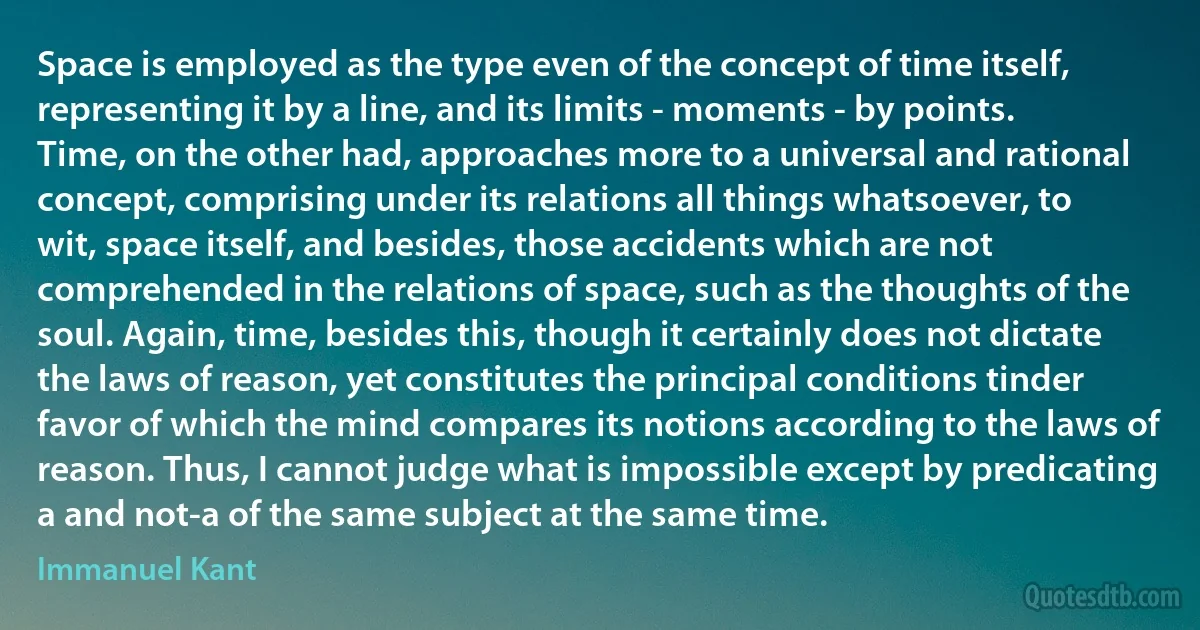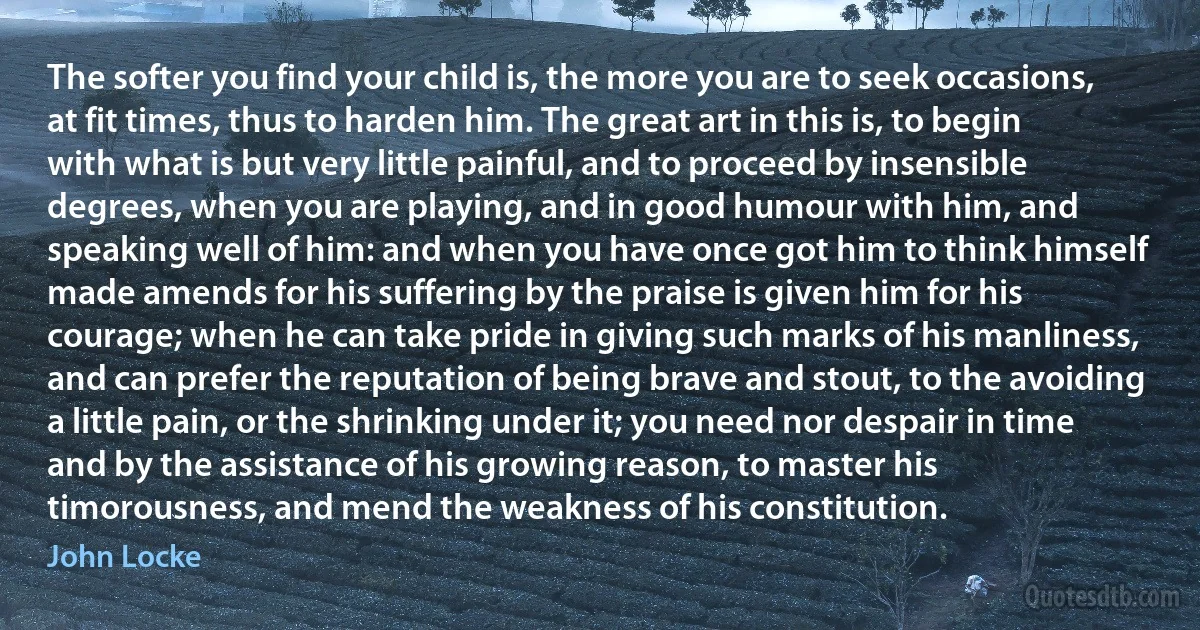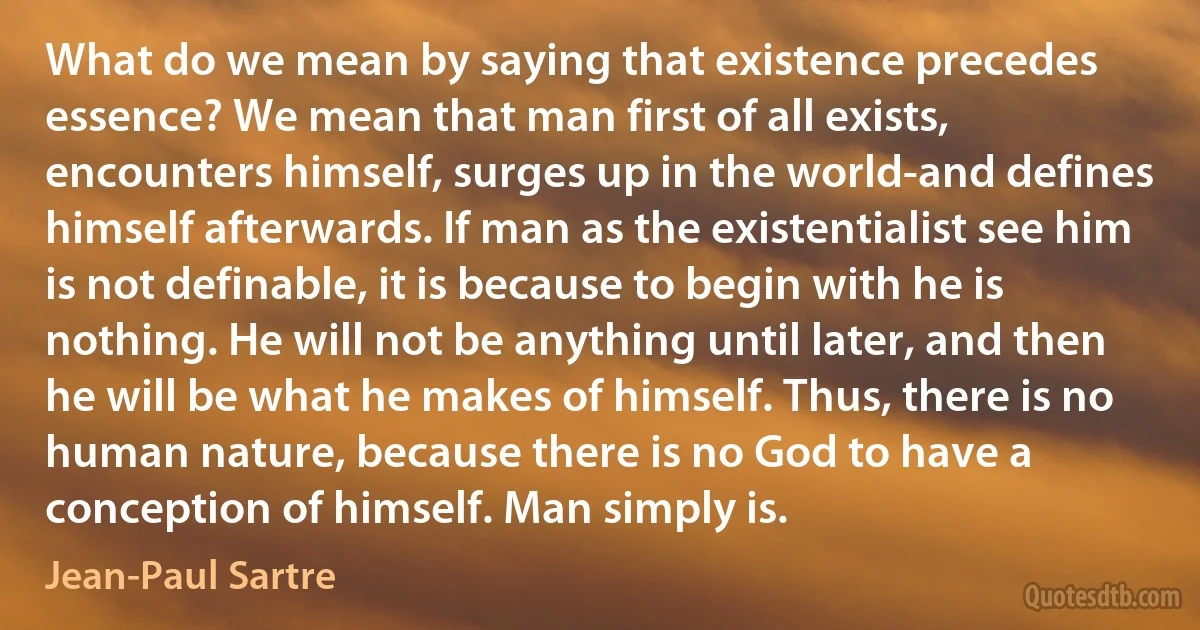Thus Quotes - page 68
I maintain that in every special natural doctrine only so much science proper is to be met with as mathematics; for... science proper, especially of nature, requires a pure portion, lying at the foundation of the empirical, and based upon à priori knowledge of natural things. ...the conception should be constructed. But the cognition of the reason through construction of conceptions is mathematical. A pure philosophy of nature in general, namely, one that only investigates what constitutes a nature in general, may thus be possible without mathematics; but a pure doctrine of nature respecting determinate natural things (corporeal doctrine and mental doctrine), is only possible by means of mathematics; and as in every natural doctrine only so much science proper is to be met with therein as there is cognition à priori, a doctrine of nature can only contain so much science proper as there is in it of applied mathematics.

Immanuel Kant
The prejudices of the second species, since they impose upon the intellect by the sensual conditions restricting the mind if it wishes in certain cases to attain to what is intellectual, lurk more deeply. One of them is that which affects knowledge of quantity, the other that affecting knowledge of qualities generally. The former is: every actual multiplicity can be given numerically, and hence, every infinite quantity; the latter, whatever is impossible contradicts itself. In either of them the concept of time, it is true, does not enter into the very notion of the predicate, nor is it attributed as a qualification to the subject. But yet it serves as a means for forming an idea of the predicate, and thus, being a condition, affects the intellectual concept of the subject to the extent that the latter is only attained by its aid.

Immanuel Kant
[T]o require that a so-called layman should not use his own reason in religious matters, particularly since religion is to be appreciated as moral, but instead follow the appointed clergyman and thus someone else's reason, is an unjust demand because as to morals every man must account for all his doings. The clergyman will not and even cannot assume such a responsibility.

Immanuel Kant
Habit... makes the endurance of evil easy (which, under the name of patience, is falsely honored as a virtue), because sensations of the same type, when continued without alteration for a long time, draw our attention away from the senses so that we are scarcely conscious of them at all. On the other hand, habit also makes the consciousness and the remembrance of good that has been received more difficult, which then gradually leads to ingratitude (a real vice). [...] Acquired habit deprives good actions of their moral value because it undermines mental freedom and, moreover, it leads to thoughtless repetitions of the same acts (monotony), and thus becomes ridiculous.

Immanuel Kant
All true metaphysics is taken from the essential nature of the thinking faculty itself, and therefore in nowise invented, since it is not borrowed from experience, but contains the pure operations of thought, that is, conceptions and principles à priori, which the manifold of empirical presentations first of all brings into legitimate connection, by which it can become empirical knowledge, i.e. experience. ...mathematical physicists were thus quite unable to dispense with such metaphysical principles...

Immanuel Kant
Money is only important for what it will procure. Thus a change in the monetary unit, which is uniform in its operation and affects all transactions equally, has no consequences. If, by a change in the established standard of value, a man received and owned twice as much money as he did before in payment for all rights and for all efforts, and if he also paid out twice as much money for all acquisitions and for all satisfactions, he would be wholly unaffected.

John Maynard Keynes
The good want power, but to weep barren tears.
The powerful goodness want: worse need for them.
The wise want love; and those who love want wisdom;
And all best things are thus confused to ill.
Many are strong and rich, and would be just,
But live among their suffering fellow-men
As if none felt: they know not what they do.

Percy Bysshe Shelley
Though you give no countenance to the complaints of the querulous, yet take care to curb the insolence and ill nature of the injurious. When you observe it yourself, reprove it before the injur'd party: but if the complaint be of something really worth your notice, and prevention another time, then reprove the offender by himself alone, out of sight of him who complain'd and make him go and ask pardon, and make reparation; which ooming thus, as it were from himself, will be the more cheerfully performed, and more kindly receiv'd, the love strenghten'd between them, and a custom of civility grow familiar amongst your children.

John Locke
In order to be able thus to misjudge, and thus to grant left-handed veneration to our classics, people must have ceased to know them. This, generally speaking, is precisely what has happened. For, otherwise, one ought to know that there is only one way of honoring them, and that is to continue seeking with the same spirit and with the same courage, and not to weary of the search.

Friedrich Nietzsche
Each human reality is at the same time a direct project to metamorphose its own For-itself into an In-itself-For-itself, a project of the appropriation of the world as a totality of being-in-itself, in the form of a fundamental quality. Every human reality is a passion in that it projects losing itself so as to found being and by the same stroke to constitute the In-itself which escapes contingency by being its own foundation, the Ens causa sui, which religions call God. Thus the passion of man is the reverse of that of Christ, for man loses himself as man in order that God may be born. But the idea of God is contradictory and we lose ourselves in vain. Man is a useless passion.

Jean-Paul Sartre
A man who belongs to some communist or revolutionary society wills certain concrete ends, which imply the will to freedom, and that freedom is willed in community. We will freedom for freedom's sake, and in and through the particular circumstances. And in thus willing freedom, we discover that it depends entirely upon the freedom of others and that the freedom of others depends upon our own.

Jean-Paul Sartre
You see, I divide men into three categories: those who have a lot of money, those who have none at all and those who have a little. The first want to keep what they have: their interest is to maintain order; the second want to take what they do not have: their interest is to destroy the existing order and to establish one which is profitable to them. They each are realist, people with whom one can agree. The third group want to overthrow the social order to take what they do not have, while still preserving it so that no one takes away what they have. Thus, they preserve in fact what they destroy in theory, or they destroy in fact what they seem to preserve. Those are the idealists.

Jean-Paul Sartre
In my opinion, condemning the Zionist movement as "nationalistic" is unjustified. Consider the path by which Herzl came to his mission. Initially he had been completely cosmopolitan. But during the Dreyfus trial in Paris he suddenly realized with great clarity how precarious was the situation of the Jews in the western world. And courageously he drew the conclusion that we are discriminated against or murdered not because we are Germans, Frenchmen, Americans, etc. of the "Jewish faith" but simply because we are Jews. Thus already our precarious situation forces us to stand together irrespective of our citizenship.
Zionism gave the German Jews no great protection against annihilation. But it did give the survivors the inner strength to endure the debacle with dignity and without losing their healthy self respect. Keep in mind that perhaps a similar fate could be lying in wait for your children.

Albert Einstein



